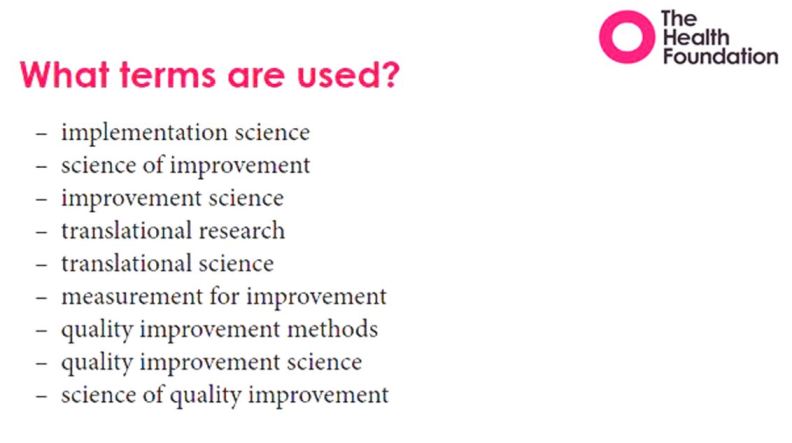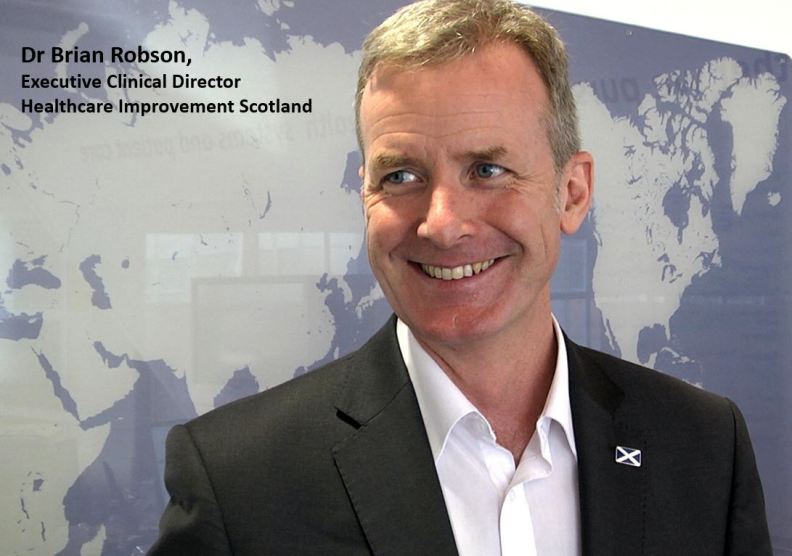On Friday the 25th of November 2016 I gave a talk for the Scottish Philosophy and Psychiatry Special Interest Group.
My subject was “Improvement Science”.
The following is based on the slides and the four short films that I presented.
My talk was entitled:

The meeting was held at the Golden Lion Hotel, Stirling:
I explained to the audience that like Dr Rev I M Jolly I can be overly pessimistic [to watch Dr Jolly please click here or on the image below]:
The dictionary definition of ‘Improvement’:

The dictionary definition of ‘Science’:
 My concern is any pre-determinism to science:
My concern is any pre-determinism to science:
The Health Foundation have considered Improvement Science: this is from 2011:

Many different terms are used including “QI” for “Quality Improvement”:

This is where improvement science began, in Boston, Massachusetts:

The Founder of the Institute for Healthcare Improvement (IHI) was Don Berwick:
The first description of this movement in Britain goes back to 1992 by Dr Godlee:

Fifteen years later, Dr Godlee, Editor of the BMJ, said this:

Only last month the BMJ briefly interviewed Don Berwick:
IHI describes improvement science as being based on a “simple, effective tool”:

This tool was developed from the work of an American engineer, W. A. Deming:
The “Model for Improvement” Tool [TM] is described by IHI as a “simple, yet powerful tool”:
The current President and CEO of IHI is Derek Feeley:
Up until 2013, Derek Feeley was Chief Executive [Director General] for NHS Scotland:

In April 2013 Derek Feeley resigned from NHS Scotland:
22nd February 2015 it was reported: “The astonishing and largely hidden influence of an American private healthcare giant at the heart of Scotland’s NHS”:
Dr Brian Robson, Executive Clinical Director for Healthcare Improvement Scotland [HIS] is an “IHI Fellow”:
Professor Jason Leitch, National Clinical Director for the Scottish Government is an “IHI Fellow”:

Might we be facing the biggest change to healthcare in Scotland since the NHS began?
Improvement science is moving quickly and widely across Scotland:
This “Masterclass 1” for Board members cost £146,837:

An NHS Board member commented after the Masterclass:

Healthcare Improvement Scotland is one organisation with a very wide remit over NHS Scotland and it works closely with the Scottish Government:
Nine cohorts of Safety Fellows and National Improvers have so far been trained following IHI methodology:

I was reminded of the current enthusiasm for improvement science when the Convener of a recent Scottish Parliament Committee meeting said of targets (another approach enthusiastically taken by NHS Scotland):
What is the place of ethics in Improvement Science?

In 2007 the Hastings Centre, USA, looked into this in some depth:
The Hastings Centre argue that Improvement science cannot ignore ethics:

In 2011 the Health Foundation, UK, produced this “Evidence Scan”:
The Health Foundation commented that “improvement science is just emerging”:
 The Evidence Scan found a “real paucity of evidence about the field of improvement science”:
The Evidence Scan found a “real paucity of evidence about the field of improvement science”:
I would also suggest that there is a real paucity of philosophy about the field of improvement science:
The Health Foundation did find papers on the conceptual nature of Improvement Science but concluded that:
Mary Midgley is a philosopher now aged 95 years who is widely respected for her ethical considerations:
Chapter 7 of her book “Heart and Mind: The Varieties of Moral Experience” begins:
Mary Midgley is concerned about the overuse of reductionist tests in medicine stating that:

This film is about the potential consequences of inappropriate reductionism:
[To play Mary’s Coloured Jars please click here or on the image above]
Leon Eisenberg has written many papers about this subject. He argues that reductionism should not be “abandoned” but that we must keep sight of where such an approach is scientifically useful and also where it is inappropriate:
In the Hastings Report, Margaret O’Kane asks:
In my view the answer to this question is YES. I am hopeful that the National Improvers recruited to NHS Scotland would agree:
As an NHS doctor I have seen unintentional harm brought about by National improvement work in Scotland. This related to a “Screening Tool” that was introduced across Scotland as part of this work. I found that the unintended consequences of the use of the following tool included implications for patients’ autonomy and the risk of over treatment:

Both the Hasting Group and the Health Foundation are of the view that improvement science cannot separate itself from the ethical requirements of research:
This article published in February 2016 argues that individual “rights transcend all aspects of Improvement science”
The following is a verbatim representation of a conversation held by National Improvers working in NHS Scotland:
In November 2016 Professor Joshi, also a psychiatrist outlined his concerns about reductionism in a published letter to the BMJ:
In this short film the mechanical language of healthcare improvers is considered:
Professor John Bruce was a Moral Philosopher in Edinburgh University in the 18th century. He built this temple, the “Temple of Decision”, in the grounds of his home by Falkland Palace so that he could consider his thesis:
Professor John Bruce did not succeed in his endeavour. His Temple however stood for many years:
But it eventually collapsed and his endeavour to “reduce the science of morals to the same certainty that attends other sciences” collapsed with it.
Any search of Healthcare Improvement Scotland for “ethics” finds this result:
This film is about more up-to-date buildings – the enthusiasm for which was based on improvement science: The Red Road flats in Glasgow:
To play Red Road Flats please click here.









































Thanks Peter for letting us browse a second time through your line up of other people’s thoughts and letting us see your own train of quality thinking shining through them. And now the rest of the world can see them for a first time. In case the importance of your concerns needs emphasising I add my voice to yours. Ethics becomes one vote more political. The more voices the more likely it won’t be dismissed.
The point is that if a single minded mob of health board members and managers et al storm gleefully forward, convinced of their valuable mission, without thinking carefully and checking systematically with the patients who are supposed to get the benefit for their permission and experience of their stampede, the mob may be more like a cult that does no one any good and wastes a lot of time and money.
What is lawful is not always ethical because insufficient attention was given to human rights when some laws related to non-consensual treatment were passed.
Reblogged this on Chrys Muirhead .
I have received this encouragingly open response from the Chief Executive of Healthcare Improvement Scotland:
From: PEARSON, Robbie (HEALTHCARE IMPROVEMENT SCOTLAND)
Sent: 30 November 2016
To: Peter J Gordon
Cc: COIA, Denise (HEALTHCARE IMPROVEMENT SCOTLAND)
Subject: Re: My talk on Improvement Science 25 November 2016
Dear Dr Gordon
Many thanks for sharing the slides with me.
I was interested to hear your thoughts and views on this issue, and the challenges in delivering sustained improvements in an increasingly complex environment. In such circumstances, there will inevitably be a need to have a broad range of approaches, and which are sensitive to the service and context in which we operate.
As Healthcare Improvement Scotland’s range of stakeholders becomes more diverse, it becomes even more important that we adjust our approach to local needs and circumstances. Our planning process for 2017 onwards, has that as an important theme.
My thanks again for sharing your presentation with me.
With best wishes
Robbie
Robbie Pearson
Chief Executive
———————————–
I have replied to Mr Pearson as follows:
From: Peter J. Gordon
Sent: 30 November 2016
To: ‘PEARSON, Robbie (HEALTHCARE IMPROVEMENT SCOTLAND)’
Cc: ‘COIA, Denise (HEALTHCARE IMPROVEMENT SCOTLAND)’
Subject: RE: My talk on Improvement Science 25 November 2016
Mossgrove, Bridge of Allan
St Andrew’s day 2016
Dear Mr Pearson,
Thank you for this kind reply which indicates that Healthcare Improvement Scotland is open to approaches beyond improvement science/methodology. Many would argue that ethics, philosophy, culture and history are integral to a deeper understanding of healthcare.
I realise that I am a critical thinker but I hope that you understand that does not mean I have a fundamental problem with improvement or science. Critical analysis is essential to counter an understandable tendency to follow the crowd.
I must congratulate you on your well-deserved appointment as Chief Executive of Healthcare Improvement Scotland.
Kind wishes
Peter
Nowadays a consumer rather than a supplier of any proposed or established healthcare improvements, I congratulate you, Peter, on your deep-thinking approach to these matters.
NHS Scotland chiefs living it up at Florida Conference
http://chrysmuirheadwrites.blogspot.co.uk/2016/12/nhs-scotland-chiefs-living-it-up-at.html
Sunday Express: NHS Scotland bosses under fire for lavish Florida conference while hospitals are ‘failing’:
http://www.express.co.uk/news/uk/742118/NHS-Scotland-bosses-Orlando-conference-hospitals-failing